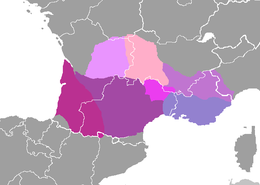Occitan language
Occitan[7][8] is known as lenga d'òc by its native speakers.
| Occitan | |
|---|---|
| occitan, lenga d'òc, provençal | |
| Native to | France, Spain, Italy, Monaco |
Native speakers | estimates range from 100,000 to 800,000 (2007–2012)[1][2] |
Early form | |
| Dialects |
|
| Official status | |
Official language in | Catalonia (Spain) |
Recognised minority language in | |
| Regulated by | Conselh de la Lenga Occitana;[4] Congrès Permanent de la Lenga Occitana;[5] Institut d'Estudis Aranesi[6] |
| Language codes | |
| ISO 639-1 | oc |
| ISO 639-2 | oci |
| ISO 639-3 | oci – inclusive codeIndividual code: sdt – (Judeo-Occitan) |
| Glottolog | occi1239 |
| Linguasphere | 51-AAA-g & 51-AAA-f |
 | |
 various dialects of Occitan | |
It is a Romance language spoken in the south of France, the Occitan Valleys of Italy, the Val d'Aran of Catalonia and Monaco. The regions together called Occitania. Of course, this is an unofficial name for a region in three countries! Its justification is that it is united by a culture.
Occitan took a different path from Latin to the main official languages. It is sometimes called lenga d'òc ("language of oc", French: langue d'oc) because its word for yes is òc, as opposed to oil (oui) or sì in other languages. That is one way to classify Romance languages.
Occitan is an official language of Catalonia.[9] Since September 2010, the Parliament of Catalonia has considered Aranese Occitan to be the officially preferred language for use in the Val d'Aran.
Dialects
- Alpine (also named Vivaro-Alpine or Provençal Alpine)
- Auvergnat
- Gascon (including Aranese spoken in Val d'Aran, Catalonia, Spain)
- Languedocien
- Limousin
- Provençal
Some of those names (Provençal, Limousin, Gascon) were once used for the whole language.
Sources
Other websites

- Dictionary (written in Occitan)
- Ethnologue report page for language with code OCI (Occitan)
- English-Occitan lexicon
- Orbilat.com Archived 2004-06-16 at the Wayback Machine, Overview and grammar of Occitan
- Occitanet.free.fr, a guide to the language
- (in French) Ostaldoccitania.net Archived 2011-01-06 at the Wayback Machine The house of occitan associations of Toulouse
- (in French) Eonet.ne Archived 2009-05-05 at the Wayback Machine, "LexRomEdic", Electronic version of Lexique Roman of Rainouard (A provisional version is available).
